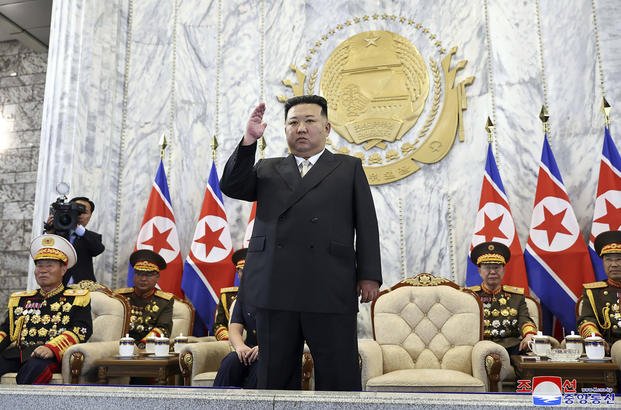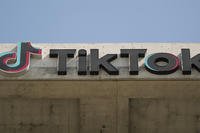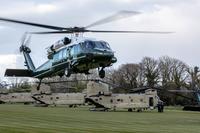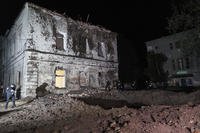SEOUL, South Korea (AP) — North Korea invited visiting Chinese delegates and Russian artists to a paramilitary parade featuring rocket launchers pulled by trucks and tractors, state media said Saturday, in leader Kim Jong Un’s latest effort to display his ties with Moscow and Beijing in the face of deepening confrontations with Washington.
The event in the capital, Pyongyang, which began Friday night to celebrate North Korea’s 75th founding anniversary that fell on Saturday, came amid expectations that Kim will travel to Russia soon for a meeting with President Vladimir Putin that could focus on North Korean arm sales to refill reserves drained by the Kremlin’s war on Ukraine.
While China has sent a delegation led by Vice Premier Liu Guozhong to the North Korea’s anniversary celebrations, Russia sent a military song and dance group.
South Korean media speculated that the lack of Russian government officials at the festivities in Pyongyang could be related to preparations for a summit between Kim and Putin, which Washington expects within the month. According to some U.S. reports, it could happen as early as next week.
Putin is expected to attend an international forum that runs from Sunday to Wednesday in the eastern city of Vladivostok, which was also the site of his first summit with Kim in 2019 and is now seen as a possible venue for their next meeting. South Korea’s spy agency told lawmakers in a closed-door briefing Thursday that North Korea and Russia could also be arranging an unexpected “surprise” route for Kim’s visit to avoid potential venues reported by the media.
North Korea has not confirmed any plans for Kim to visit Russia.
“Whether or not a Putin-Kim summit soon follows, the United States is attempting to deter serious violations of international law by preemptively releasing intelligence,” said Leif-Eric Easley, a professor at Ewha University in Seoul.
The growing cooperation between China, Russia and North Korea, and Chinese President Xi Jinping's decision to skip the Group of 20 Summit in India, give the appearance of a widening fissure in Asia’s geopolitical landscape, he said.
Still, a major Russia-North Korea arms deal, which would breach numerous international sanctions, should worry Beijing because “association with an emerging pariah state bloc could have negative repercussions for China’s globalized but struggling economy,” Easley said.
KCNA said Kim received letters from Putin and Xi on the anniversary, where both leaders said that their countries’ strengthening ties with North Korea would contribute to the region’s peace and stability.
Saturday’s parade was centered around paramilitary organizations and public security forces protecting Pyongyang, rather than the military units that handle his nuclear-capable weapons systems, which have been the focus of other parades this year.
Millions of North Koreans between the ages of 17 and 60 are listed as Worker-Peasant Red Guards, a national civil defense organization that could be loosely compared to military reserve forces of other countries. Saturday’s marches of the Red Guards included huge columns of motorcycles, anti-tank rockets towed by tractors and civilian-style trucks equipped with multiple rocket launchers, according to KCNA’s text reports and photos.
Photos showed Kim smiling and talking with his young daughter, believed to be named Ju Ae, as they watched the parade from leather chairs set up at Kim’s balcony in Kim Il Sung Square named after his state-founding grandfather.
Since November, Kim Jong Un has been bringing his daughter — believed to be around 10 years old — to major public events involving the country’s military. Analysts say Kim’s showcasing of his daughter is meant to send a statement to the world that he has no intention of voluntarily surrendering the nuclear weapons and missiles he sees as the strongest guarantee of his survival and the extension of his family’s dynastic rule.
State media did not mention whether Kim made a speech during the parade, indicating that he likely didn’t.
KCNA said Kim met with Liu and other Chinese delegates ahead of the parade, where they exchanged views on “further intensifying the multi-faceted coordination and cooperation” between the countries.
Tensions in the Korean Peninsula are at their highest point in years, as the pace of both North Korea’s missile tests and the United States’ combined military exercises with South Korea and Japan have intensified in tit-for-tat.
To counter the deepening security cooperation between Washington, Seoul and Tokyo, Kim has been trying to boost the visibility of his partnerships with Moscow and Beijing as he seeks to break out of diplomatic isolation and have North Korea be a part of a united front against the United States.
In July, Kim invited delegations led by Russian Defense Minister Sergei Shoigu and Chinese Communist Party Politburo member Li Hongzhong to a huge military parade in Pyongyang, where he rolled out his most powerful weapons, including intercontinental ballistic missiles designed to target the U.S. mainland.
A day before the parade, Kim took Shoigu on a tour of a domestic arms exhibition, which demonstrated North Korea’s support for Russia’s invasion of Ukraine and added to suspicions the North was willing to supply arms to Russia.
In exchange for providing Russia with artillery shells and other ammunition, North Korea could seek badly needed energy and food aid and advanced weapons technologies, analysts say. There are concerns that potential Russian technology transfers would increase the threat posed by Kim’s growing arsenal of nuclear weapons and missiles that are designed to target the United States and its Asian allies.











